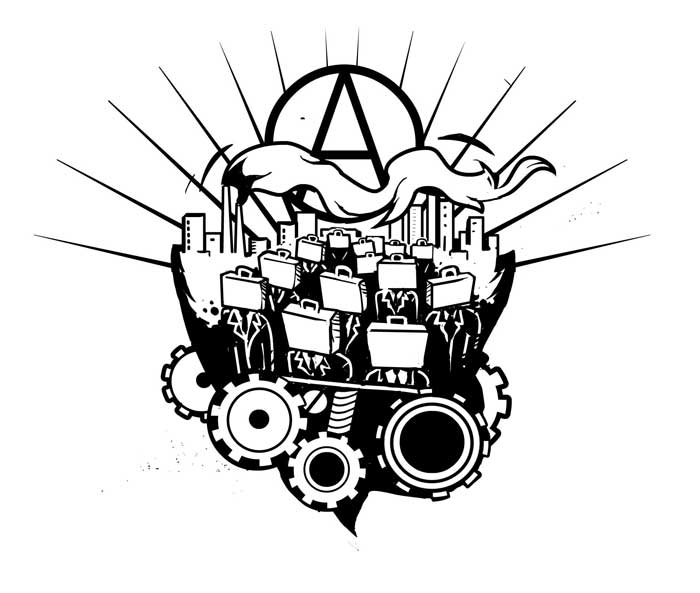Articles from Anarchy: A Journal of Desire Armed; The Politics of Blame

Tags: USA
Articles from Anarchy: A Journal of Desire Armed; The Politics of Blame published by Evanvinh
Writer Rating: 5.0000
Posted on 2016-03-15
Writer Description: Evanvinh
This writer has written 733 articles.
Author: Liana Doctrine
The Politics of Blame
So let’s just say, hypothetically, that a container ship runs into a bridge and spills a lot of fuel oil into a bay, and the news networks decide to cover the story...what would be the first angle they would emphasize? Who is to blame for the mess, of course: was the pilot on drugs, drunk, or asleep? Was containment started by the right people at the right time? Who will pay for this disaster?
Blame asks for the names of the people responsible for something wrong or unfortunate that has happened. Judicial systems are founded on the concept of blame. In every conflict two opposing parties argue over who is the victim and who is the perpetrator; there is very little room for nuance in this polarized scheme. Religions reveal similarly dichotomized paradigms with terms and concepts like sinner and saint, or good and evil. As an anarchist I am more interested in why it is politically desirable for the state to use blame, and how conflicts or problems can be understood without playing into the roles prescribed by such a mind-set.
The use of blame is advantageous for several reasons. The black and white nature of blame lends itself perfectly to having an other, which allows governments (and churches) to garner support for their policies. For instance, blaming individuals for real or fictitious acts of rebellion and labeling them “terrorists” allows a government to justify the increased surveillance of its citizens, to mask a collapsing economy, or validate a foreign occupation or war. Any desired changes to laws can be spun as solutions to a problem of these others. A population of others can also be exploited for monetary gain (eg re-building projects in war zones or domestic prisoners), or used as justification for any number of cutbacks to social programs.
Another benefit of having a paradigm of blame is the ability to dispose of influential opponents by pinning mutually created or fabricated atrocities onto them. As long as citizens accept these patsies, the government can do as it pleases. And lucky for the government, blame is in limitless supply, and cheap to manufacture.
Blame can be a seductive short cut for creating false resolutions to complicated, large scale problems. The average citizen has an interest in accepting this model of conflict resolution because it allows the majority to feel innocent, and requires no self-reflection or changes to the social order. All faults in the government are masked just enough for people to ignore them, which is more convenient for maintaining a daily existence inside the system. Of course, the use of blame works the same magic inside the anarchist milieu.
It is not difficult to come up with examples of how blame can sneak into a conversation between anarchists. It can look like someone asking questions such as: who was responsible for this? Who was bottom-lining that? Blame also can be disguised as a politically correct line, “We don’t have more people of color, women, and age diversity in the milieu because such and such group hasn’t challenged their non-revolutionary tendency to associate with people of the same age, class, and race as themselves.” Blame can also masquerade as a call to action, as suggested by statements that begin with “We will never have a revolution unless everyone is willing to...”
It is tempting to blame each other as an excuse for our lack of headway in toppling the government, but this insidious practice is distracting to our efforts. Blaming one another causes us to lose perspective in what we are up against: we overlook the very purposeful complexity and diversification of the power of the state, and are tempted to think it would be simple to disassemble if we would all just work together and do one or two things differently.
The use of blame also encourages an anarchist conservatism by weeding out the more fringe behaviors, the destructive or controversial choices, which have implications that may be more difficult to comprehend fully. It cuts off new avenues of thought and action by confining us to one path of resolution when faced with a complicated situation. Is the spirit of non-conformity and dissent only appealing when it is pointed at the government?
A paradigm of blame fosters fear by promoting conformity to an unattainable standard of perfection; if an anarchist openly admits she committed an act which she regrets, and the general response is to condemn and then punish and/or ostracize her, very few people will want to step forward with their errors. Blame encourages people to hide their mistakes or hide themselves from the comrades they disappoint.
If we can’t allow for fuck-ups, especially big ones, then there will always be allies hiding their remorse, or feeling like frauds.
The bigger pictures are veiled when we use blame; it uses a narrow interpretation of events which minimizes why people do what they do, and the circumstances they are operating in. Understanding these influences can help us identify weaknesses in our movements, and show us where we could support one another in our struggles.
But it is difficult not to look for the person who is at fault when something goes wrong, and perhaps harder not to seek to punish comrades when we are adversely affected by their actions. We must find a way to challenge each other’s choices and behaviors without the use of blame. So what is another way? How do we deal with the mistakes of others and ourselves without becoming punishing or moralistic? There is no simple answer, but there are some ways we might start to divorce ourselves from this divisive, state-approved approach to conflict.
Getting around the blame trap could start with rejecting the value system put forward by capitalists. Specifically, we could decline to valorize efficiency, logic, or perfection — all of which underlie the concept of blame. Also, changing our language around conflict, refusing to use the labels the government uses to assign polarized roles in controversies, (eg victim/perpetrator, guilty/innocent, truth/lie, or right/wrong), can remind us of the complexity of these situations, and encourage more creative resolutions. Not seeking the Truth of who is at fault when problems arise is also key to leaving blame behind; instead, our primary aim could be a rich understanding of the people involved: their intentions, motivations, experiences, histories, and limitations. This approach could inspire communities to think of every conflict as social in nature, problems we need cooperation to understand, analyze, and remedy. This collective response could help circumvent the assigning of blame and punishment by involving interested members of a community, rather than focusing on the questionable acts of a few isolated individuals.
Anarchists have used a variety of tactics to approach the problem of dismantling the state. Appreciating and utilizing this diverse approach is what keeps us vital and impossible to eradicate, and reminds us there is no one way to be an anarchist, and also no one person, group, or tactic to blame for our failure to accomplish our objectives. There are no rules about what strategies are most successful, and no laws to judge each other against. Each of us is free to hack away gleefully at whatever leg of the state we find most appealing or rewarding to attack.
Letting go of blame requires trust. Trust that we’re all doing something amazing... maybe something no one will ever talk about, but something secret that will continue to inspire us over the years, and something we can carry in our hearts forever.
Sources: https://theanarchistlibrary.org/library/liana-doctrine-articles-from-anarchy-a-journal-of-desire-armed
You have the right to stay anonymous in your comments, share at your own discretion.


